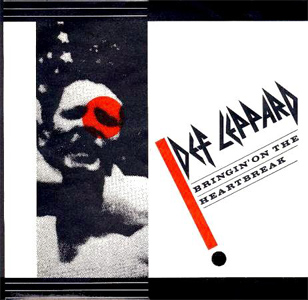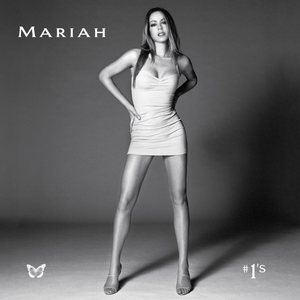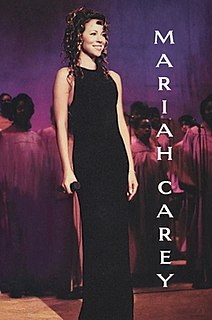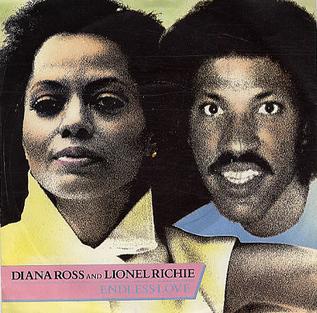"Without You" is a song written by Pete Ham and Tom Evans of British rock group Badfinger, and first released on their 1970 album No Dice. The power ballad has been recorded by over 180 artists, and versions released as singles by Harry Nilsson (1971), T. G. Sheppard (1983) and Mariah Carey (1994) became international best-sellers. The Nilsson version was included in 2021's Rolling Stone's 500 Greatest Songs of All Time. Paul McCartney once described the ballad as "the killer song of all time".

The Emancipation of Mimi is the tenth studio album by American singer Mariah Carey, released through Island Records on April 12, 2005. The album was considered Carey's "comeback album" by critics and became her highest-selling release in the US in a decade. In composing the album, Carey collaborated with many songwriters and producers throughout 2004, including Jermaine Dupri, Snoop Dogg, Kanye West, Twista, Nelly, Pharrell Williams, and James "Big Jim" Wright, many of whom appeared as featured guests on select tracks.

Butterfly is the sixth studio album by American singer-songwriter Mariah Carey, released on September 16, 1997, by Columbia Records. The album contains both hip hop and urban adult contemporary sounds, as well as some softer and more contemporary melodies. Throughout the project, Carey worked with Walter Afanasieff, with whom she had written and produced most of the material from her previous albums. She also worked with many famed hip hop producers and rappers, such as Sean "Puffy" Combs, Q-Tip, Missy Elliott and the Trackmasters. With the latter acts producing most of the album, Butterfly deviated from the adult contemporary sound of Carey's previous albums.

"Bringin' On the Heartbreak" is a power ballad originally recorded by English rock band Def Leppard. It was the second single from their 1981 album High 'n' Dry. The song was written by three of the band's members: Steve Clark, Pete Willis, and Joe Elliott.

American singer Mariah Carey has released 86 official singles, 22 promotional singles, and has made 30 guest appearances. Her self-titled debut album in 1990 yielded four number-one singles on the Billboard Hot 100, the first being "Vision of Love", a song credited with revolutionizing the usage of distinguished vocal stylings, predominantly the practice of melisma, and effectively influencing virtually every female R&B performer since the 1990s. Subsequent singles "Emotions" (1991) and Carey's cover of the Jackson 5 track, "I'll Be There" (1992) continued the singer's streak of US number-one singles, with the latter becoming her fourth chart-topper in Canada and first in the Netherlands. With the release of Carey's third studio album, Music Box (1993), the singer's international popularity surged upon release of "Hero" and the album's third single, her cover of Harry Nilsson's "Without You", which became the singer's first number-one single in several countries across Europe.

"All I Want for Christmas Is You" is a song recorded by American singer Mariah Carey for her fourth studio album and first holiday album, Merry Christmas (1994). Written and produced by Carey and Walter Afanasieff, the song was released as the lead single from the album on November 1, 1994. The track is an uptempo love song that includes bell chimes, backing vocals and synthesizers. The song has become a Christmas standard and continues to surge in popularity each holiday season.

"I Don't Wanna Cry" is a song recorded by American singer-songwriter Mariah Carey for her eponymous debut studio album (1990). Written by Carey and Narada Michael Walden, and produced by the latter, the song was released as the album's fourth single in March 1991 by Columbia Records.

"Someday" is a song by American singer and songwriter Mariah Carey from her self-titled debut studio album (1990). It is a dance-pop, new jack swing and R&B song. Prior to Carey signing a record contract, she and producer Ben Margulies had written and produced a four-track demo which included "Someday". After signing a contract with Columbia Records, Carey began work on her debut album and she reached out to Ric Wake to ask if he would produce the song, to which he agreed. The composition of the demo recording was changed during the recording process, most notably replacing the horns with a guitar, which Carey disapproved of.

"Love Takes Time" is a song recorded by American singer-songwriter Mariah Carey for her eponymous debut studio album (1990). Written by Carey and Ben Margulies, while produced by Walter Afanasieff, the song was released as the second single from the album on August 22, 1990, by Columbia Records. An adult contemporary-influenced ballad, the song follows its protagonist lamenting the loss of a lover and confesses that "love takes time" to heal and that her feelings for her ex-lover remain.

#1's is the first greatest hits album by American singer-songwriter Mariah Carey, released by Columbia Records on November 17, 1998. The album contained Carey's then thirteen number-one singles on the Billboard Hot 100, as well as four new songs. In Japan, the album also included her popular single, "All I Want for Christmas Is You", which was Carey's biggest selling single there.

"My All" is a song by American singer-songwriter Mariah Carey from her sixth studio album, Butterfly (1997). It was released as the album's fifth single overall and second commercial single on April 21, 1998, by Columbia Records. The song was written and produced by Carey and Walter Afanasieff. "My All" is built around Latin guitar chord melodies, and makes subtle use of Latin percussion throughout the first chorus, before taking on a more conventional R&B-style beat. Carey was inspired to write the song and use Latin inspired melodies after a trip to Puerto Rico, where she was influenced by the culture. The song's lyrics tell of a lonely woman declaring she would give "her all" to have just one more night with her estranged lover. It is the first song Carey wrote for the Butterfly album.

"Hero" is a song by American singer-songwriter, and record producer Mariah Carey released on October 18, 1993, via Columbia Records as the second single from her third studio album, Music Box (1993). The song was originally recorded by Gloria Estefan. The song was written and produced by Carey and Walter Afanasieff. While writing the song, Carey did not connect to its style or sound, therefore forfeiting it over to Estefan who sang it for the soundtrack of the film of the same name (1992). However, after being convinced by Sony executive Tommy Mottola to keep it, she changed some of the lyrics to more precisely fit her personality. Lyrically, the song is regarded as one of Carey's most inspirational and personal ballads, with its protagonist declaring that even though people may feel discouraged or down at times, in reality, they are "heroes" if they look inside themselves and see their own inner strength; in time, it will help them "find the way".

"Fantasy" is a song recorded by American singer-songwriter, and record producer Mariah Carey for her fifth studio album, Daydream (1995), released on August 23, 1995, by Columbia Records as the lead single from the album. The song was written by Carey and Dave Hall, both serving as primary producers. The song heavily samples Tom Tom Club's 1981 song "Genius of Love" and incorporates various other beats and grooves arranged by the former. The song's lyrics describe a woman who is in love with a man, and how every time she sees him she starts fantasizing about an impossible relationship with him. The remix for the song features rap verses from Ol' Dirty Bastard, something Carey arranged to assist in her crossover into the hip-hop market and credited for introducing R&B and hip hop collaboration into mainstream pop culture, and for popularizing rap as a featuring act.

"Always Be My Baby" is a song by American singer-songwriter Mariah Carey from her fifth studio album, Daydream (1995). It was released by Columbia Records on March 9, 1996, as the third US single and fourth overall. The song was written and produced by Carey, Jermaine Dupri and Manuel Seal. A midtempo song, its lyrics describe the feeling of attachment and unity the singer feels towards her estranged lover, even though they are no longer together, she says he will always be a part of her and will "always be her baby" even after they move on.

Fantasy: Mariah Carey at Madison Square Garden is Mariah Carey's fourth DVD/home video release. It presents Carey performing live at the Madison Square Garden on October 10, 1995. The home video was originally released in early 1996, and the DVD was released in late 2004. It was distributed by Columbia Pictures.

Here Is Mariah Carey, also known as Mariah Carey or This Is Mariah Carey, is the third video album by American singer Mariah Carey. It presents Carey performing live at Proctor's Theatre in Schenectady, New York, in July 1993, and also includes non-concert footage. Carey performs ten songs during the video; four are from her third studio album Music Box (1993), which Columbia Records commissioned Here Is Mariah Carey to promote. She is sporadically accompanied by a band, choir, dancers, and string musicians. In creating the stage for the performance, production designers sought inspiration from works by Boris Aronson and Josep Maria Jujol. Lawrence Jordan, who collaborated with Carey on previous occasions, directed the hour-long video.

The First Vision is the debut video album by American singer Mariah Carey. It is a collection of music videos, live performances, and behind-the-scenes footage detailing the creation of Carey's debut album Mariah Carey (1990).

Music Box is the third studio album by American singer-songwriter Mariah Carey. It was released by Columbia Records on August 31, 1993. The album comprises ballads primarily written by Carey and Walter Afanasieff, with whom she had previously worked on Emotions (1991), and a few urban dance tracks. During the course of the album's development, Carey wanted to broaden her audience, choosing a more pop/R&B oriented sound. During this time frame, she experimented with different musical instruments, leading the album's sound away from her more contemporary previous two efforts. Two additional tracks from the album sessions were released, with "Do You Think of Me" serving as the B-side to "Dreamlover" and "Everything Fades Away" and being featured on international editions of Music Box.

Merry Christmas is the fourth studio album by American singer Mariah Carey, and her first Christmas album. Released by Columbia Records on October 28, 1994, at the peak of the initial stretch of Carey's career, between Music Box (1993) and Daydream (1995), the album features cover versions of popular Christmas songs in addition to original material. Carey worked with Walter Afanasieff, with whom she wrote all of the original tracks, as well as producing Carey's interpretations of the covered material. Three singles were released from the album, of which "All I Want for Christmas Is You" went on to become one of the best-selling singles of all time and the best-selling Christmas ringtone in the United States.

"Endless Love" is a song written by Lionel Richie and originally recorded as a duet between Richie and Pop icon singer/actress Diana Ross. In this ballad, the singers declare their "endless love" for one another. It was covered by Luther Vandross with fellow R&B singer Mariah Carey and also by country music singer Shania Twain. Richie's friend Kenny Rogers has also recorded the song. Billboard has named the original version as the greatest song duet of all-time.



















